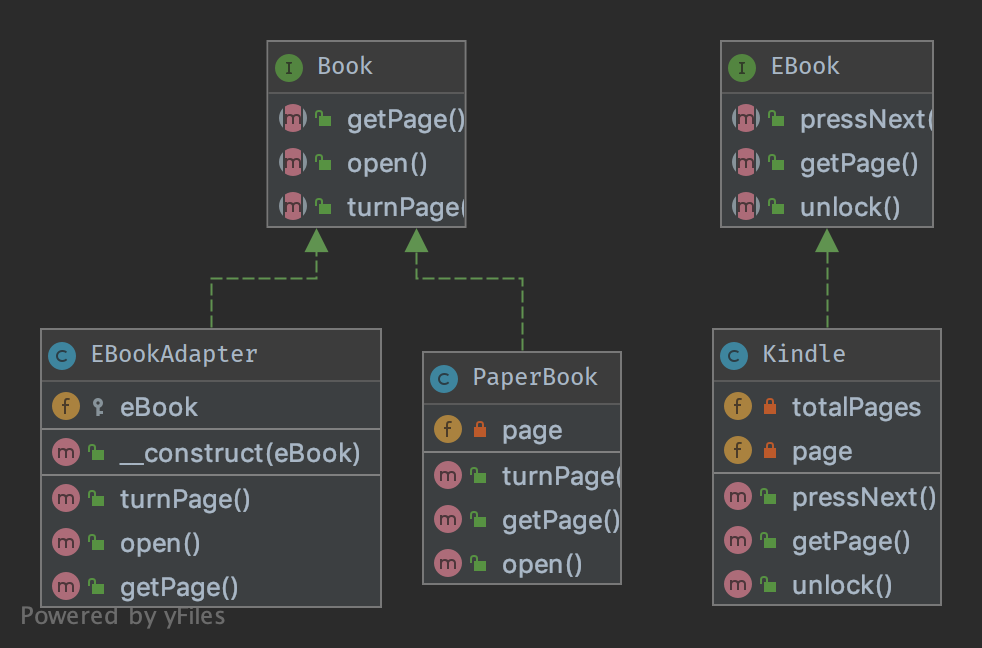2.1. Adapter (Adapter / Wrapper)
2.1.1. Przeznaczenie
Adapter pozwala z jednej strony na opakowanie interfejsu istniejącej klasy nowym, kompatybilnym z naszą aplikacją. Z drugiej strony pozwala współpracować klasom o niekompatybilnych interfejsach poprzez udostępnienie nowego interfejsu (bazującego na niekompatybilnych interfejsach).
2.1.2. Przykłady
Adaptery bibliotek do łączenia się z bazami danych.
Używanie różnych webserwisów i adapterów pozwala nam w spójny sposób korzystać z danych (na przykład kiedy korzystamy z ogólnodostępnych API).
2.1.3. Diagram UML

2.1.4. Kod
Ten kod znajdziesz również na GitHub.
Book.php
1<?php
2
3declare(strict_types=1);
4
5namespace DesignPatterns\Structural\Adapter;
6
7interface Book
8{
9 public function turnPage();
10
11 public function open();
12
13 public function getPage(): int;
14}
PaperBook.php
1<?php
2
3declare(strict_types=1);
4
5namespace DesignPatterns\Structural\Adapter;
6
7class PaperBook implements Book
8{
9 private int $page;
10
11 public function open(): void
12 {
13 $this->page = 1;
14 }
15
16 public function turnPage(): void
17 {
18 $this->page++;
19 }
20
21 public function getPage(): int
22 {
23 return $this->page;
24 }
25}
EBook.php
1<?php
2
3declare(strict_types=1);
4
5namespace DesignPatterns\Structural\Adapter;
6
7interface EBook
8{
9 public function unlock();
10
11 public function pressNext();
12
13 /**
14 * returns current page and total number of pages, like [10, 100] is page 10 of 100
15 *
16 * @return int[]
17 */
18 public function getPage(): array;
19}
EBookAdapter.php
1<?php
2
3declare(strict_types=1);
4
5namespace DesignPatterns\Structural\Adapter;
6
7/**
8 * This is the adapter here. Notice it implements Book,
9 * therefore you don't have to change the code of the client which is using a Book
10 */
11class EBookAdapter implements Book
12{
13 public function __construct(protected EBook $eBook)
14 {
15 }
16
17 /**
18 * This class makes the proper translation from one interface to another.
19 */
20 public function open()
21 {
22 $this->eBook->unlock();
23 }
24
25 public function turnPage()
26 {
27 $this->eBook->pressNext();
28 }
29
30 /**
31 * notice the adapted behavior here: EBook::getPage() will return two integers, but Book
32 * supports only a current page getter, so we adapt the behavior here
33 */
34 public function getPage(): int
35 {
36 return $this->eBook->getPage()[0];
37 }
38}
Kindle.php
1<?php
2
3declare(strict_types=1);
4
5namespace DesignPatterns\Structural\Adapter;
6
7/**
8 * this is the adapted class. In production code, this could be a class from another package, some vendor code.
9 * Notice that it uses another naming scheme and the implementation does something similar but in another way
10 */
11class Kindle implements EBook
12{
13 private int $page = 1;
14 private int $totalPages = 100;
15
16 public function pressNext()
17 {
18 $this->page++;
19 }
20
21 public function unlock()
22 {
23 }
24
25 /**
26 * returns current page and total number of pages, like [10, 100] is page 10 of 100
27 *
28 * @return int[]
29 */
30 public function getPage(): array
31 {
32 return [$this->page, $this->totalPages];
33 }
34}
2.1.5. Testy
Tests/AdapterTest.php
1<?php
2
3declare(strict_types=1);
4
5namespace DesignPatterns\Structural\Adapter\Tests;
6
7use DesignPatterns\Structural\Adapter\PaperBook;
8use DesignPatterns\Structural\Adapter\EBookAdapter;
9use DesignPatterns\Structural\Adapter\Kindle;
10use PHPUnit\Framework\TestCase;
11
12class AdapterTest extends TestCase
13{
14 public function testCanTurnPageOnBook()
15 {
16 $book = new PaperBook();
17 $book->open();
18 $book->turnPage();
19
20 $this->assertSame(2, $book->getPage());
21 }
22
23 public function testCanTurnPageOnKindleLikeInANormalBook()
24 {
25 $kindle = new Kindle();
26 $book = new EBookAdapter($kindle);
27
28 $book->open();
29 $book->turnPage();
30
31 $this->assertSame(2, $book->getPage());
32 }
33}